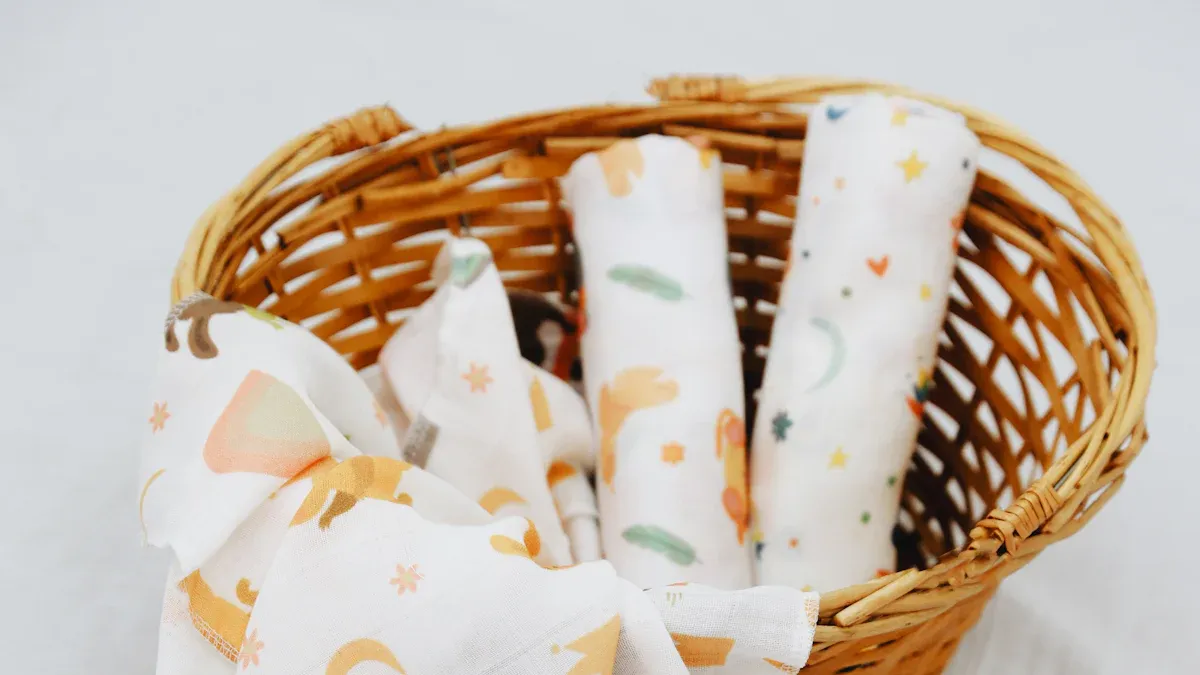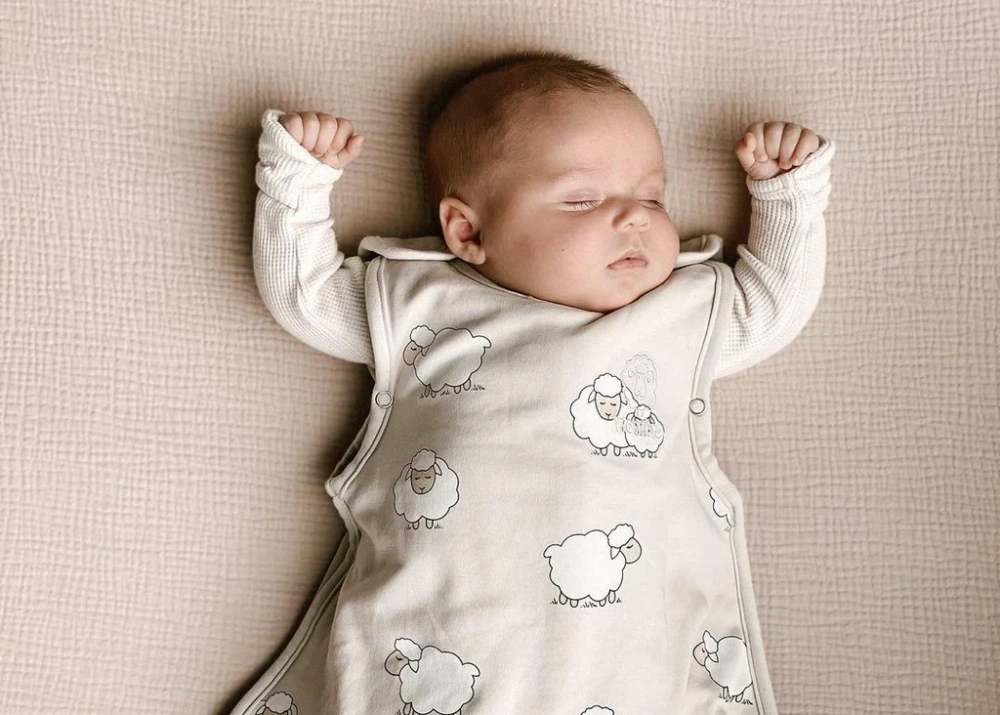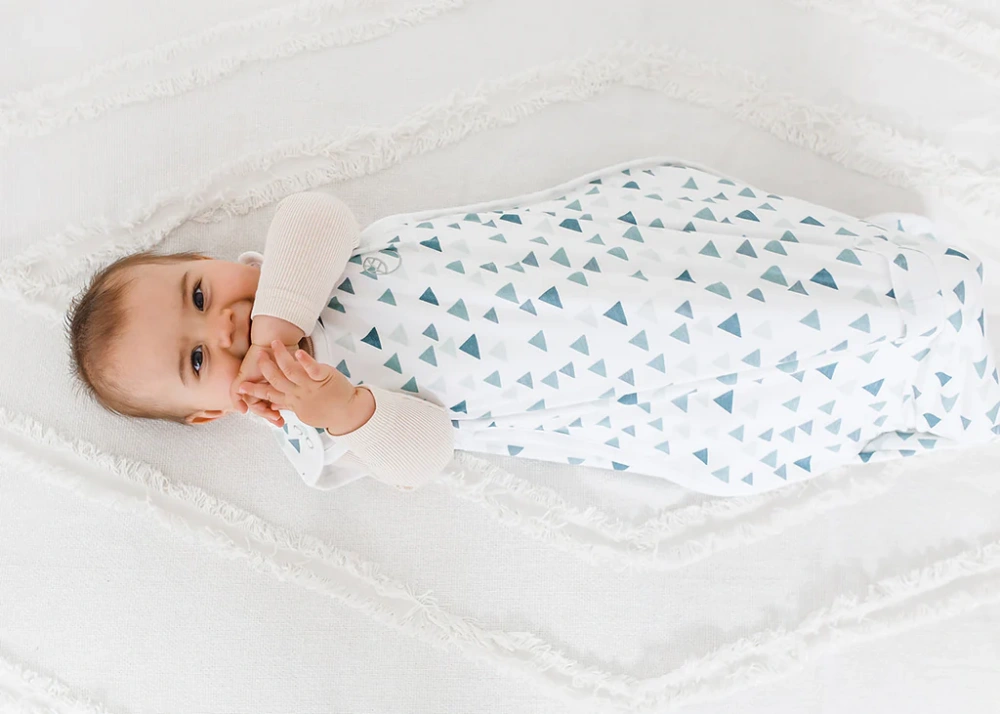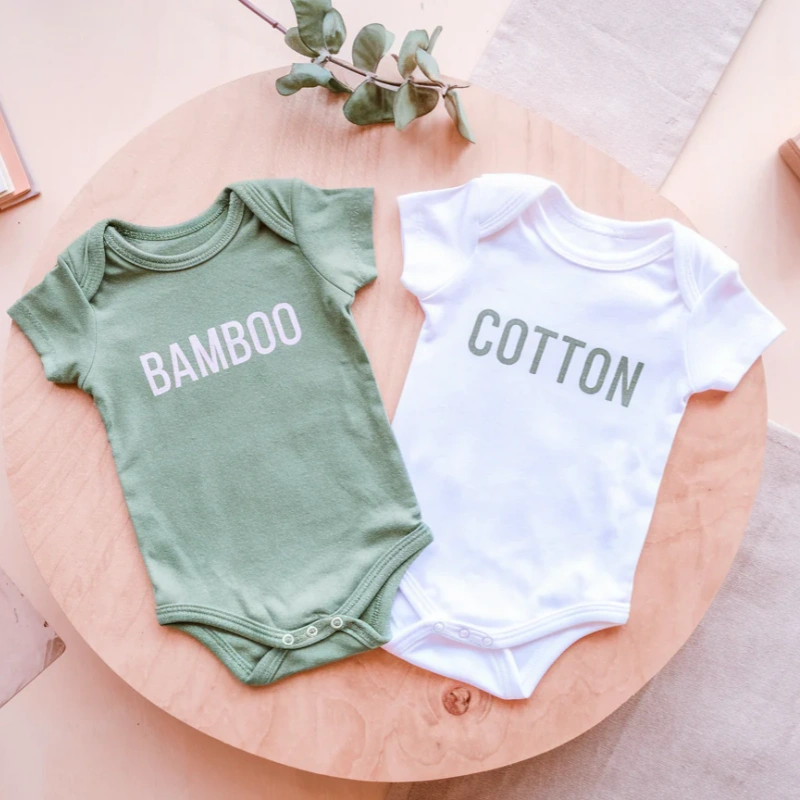
When you face the decision of bamboo vs cotton for baby, safety, comfort, and eco-friendliness matter most. Cotton leads the baby apparel market with a 58% share, but bamboo is quickly gaining ground thanks to its softness, breathability, and hypoallergenic qualities.
You might find organic cotton fabrics just as gentle for babies with sensitivities. Both fabrics offer unique strengths, so choosing between bamboo and cotton depends on your baby’s essentials list and your family’s values.
Fabric Type | Market Share (2024) |
|---|---|
Cotton | 58% |
Bamboo & Others | 13% |
Key Takeaways
Bamboo fabric is naturally hypoallergenic, soft, and great for babies with sensitive skin, while organic cotton is gentle and chemical-free when certified.
Bamboo keeps babies cool and dry by wicking moisture and regulating temperature better than cotton, making it ideal for warm climates or nightwear.
Both bamboo and organic cotton support eco-friendly choices, but bamboo uses less water and grows faster, reducing environmental impact.
Cotton is durable and easy to care for, lasting through many washes, while bamboo needs gentle washing but stays soft and resists pilling.
Though bamboo baby clothes cost more upfront, both fabrics offer long-term value by providing comfort, safety, and sustainability for your baby.
Bamboo vs Cotton for Baby: Safety
Hypoallergenic Qualities
When you choose between bamboo vs cotton for baby, hypoallergenic qualities should be at the top of your list. Babies have delicate skin that can react to even small amounts of irritation. Bamboo fabric stands out because it is naturally hypoallergenic.
Pediatric dermatologists often recommend bamboo for infants with sensitive skin. This fabric reduces the risk of irritation and allergic reactions. It feels soft and smooth, which helps prevent friction on your baby’s skin. Bamboo also resists bacteria and odors, keeping clothes fresher for longer.
Cotton fabric is also a safe choice for most babies. Organic cotton, in particular, is grown without synthetic chemicals, making it gentle on sensitive skin. Many parents trust cotton because it is highly absorbent and soft.
However, regular cotton may sometimes contain residues from pesticides or dyes, so choosing certified organic cotton is best for your baby’s health.
Tip: Always look for baby products with OEKO-TEX® Standard 100 or GOTS certification. These labels mean the fabric has been tested for harmful substances and is safe for your baby’s skin.
Friendtex bamboo baby pajamas use OEKO-TEX-certified bamboo viscose. This ensures that every part of the garment, from the fabric to the zipper, is free from harmful chemicals. Friendtex also offers GOTS-certified organic cotton options, giving you peace of mind when dressing your little one.
Sensitive Skin Protection
Protecting sensitive baby skin goes beyond just choosing a soft fabric. You want materials that keep your baby dry, comfortable, and safe from irritation. Bamboo fabric excels here. It wicks moisture away from the skin, which helps prevent diaper rash and other skin irritations.
Its natural antibacterial properties help keep clothing clean and reduce the risk of skin infections. Bamboo also regulates temperature, keeping your baby cool in summer and warm in winter.
Cotton, especially organic cotton, is another excellent option for sensitive skin. It absorbs moisture well and feels soft against the skin. When you pick organic cotton, you avoid exposure to harsh chemicals, which is important for babies with allergies or eczema.
Friendtex designs their bamboo baby pajamas with your baby’s comfort in mind. The pajamas are soft, breathable, and easy to care for. They maintain their protective qualities even after many washes. Friendtex’s commitment to safety and quality means you can trust their products for your baby’s sensitive skin.
Note: While both bamboo and cotton are generally safe, experts recommend choosing organic and certified fabrics to reduce chemical exposure. This is especially important for babies with allergies or skin conditions.
Comfort & Breathability

Softness
When you touch bamboo baby clothes for the first time, you notice how silky and buttery they feel. Many parents describe bamboo fabric as softer than even high-quality cotton.
This extra comfort and softness can make a big difference for your baby, especially during sleep. Organic cotton also feels plush and gentle, but it tends to be less silky than bamboo. If you want pajamas that feel almost like cashmere, bamboo is a top choice.
Attribute | Bamboo Baby Clothing | Organic Cotton Baby Clothing |
|---|---|---|
Softness | Exceptionally soft, silky, buttery | Highly soft, plush, familiar comfort |
Temperature Regulation
Keeping your baby comfortable through the night means choosing fabrics that help regulate body temperature. Bamboo fabric stands out because it is about 20% more breathable than cotton. This breathability helps your baby stay cool in summer and warm in winter.
Textile research shows that bamboo adapts well to temperature changes, so your baby sleeps comfortably no matter the season. Friendtex bamboo baby pajamas use this feature to help prevent overheating and night sweats.
Moisture Wicking
Babies often sweat or drool, so moisture-wicking matters. Bamboo fabric absorbs up to 60% more moisture than cotton and dries faster. This means your baby stays drier and less likely to develop rashes or discomfort.
Parents often choose baby items made of bamboo for nighttime wear because of these benefits. Organic cotton absorbs moisture well but holds onto it longer, making it better for daytime use. Friendtex Baby Footie Pajamas use bamboo’s moisture-wicking power to keep your little one dry and happy.
Tip: For babies who sweat a lot or live in warm climates, bamboo baby pajamas can help keep them cool and comfortable all night.
Organic Cotton Fabrics & Sustainability

Eco-Friendly Production
When you look for eco-friendly baby items, you want to know how the fabric is made. Organic cotton fabrics come from cotton grown without synthetic pesticides or GM seeds. This method keeps the soil healthy and protects water sources from pollution.
You help support environmental sustainability when you choose organic cotton sleepwear, baby blankets, or other baby items made of organic cotton. These products often carry certifications like GOTS, which means they meet strict standards for organic farming and ethical production.
Bamboo also stands out as a sustainable choice. Bamboo grows quickly, needs little water, and does not require pesticides or fertilizers. This makes bamboo a renewable resource that has a lower environmental impact than most crops. However, turning bamboo into soft fabric sometimes involves chemicals.
Some manufacturers use closed-loop systems to reduce harm, but it is important to check for certifications like OEKO-TEX or GOTS to ensure safety and eco-friendliness.
Friendtex takes pride in using sustainable materials for babies. The brand holds certifications such as GOTS, OEKO-TEX, and the Better Cotton Initiative. These labels show that Friendtex cares about both your baby’s comfort and the planet.
Environmental Impact
You want to make choices that are gentle on the earth. Organic cotton fabrics use more water than bamboo, even though they avoid harsh chemicals. Cotton farming, even organic, can strain water supplies and sometimes affect soil health.
In contrast, bamboo grows fast, uses less water, and absorbs more carbon dioxide, which helps lower its carbon footprint.
Here’s a quick comparison:
Bamboo grows rapidly, needs little water, and does not require pesticides.
Organic cotton avoids synthetic chemicals but still uses more water than bamboo.
Both bamboo and organic cotton fabrics can be certified for safety and sustainability.
When you pick baby blankets or clothing made from these materials, you support a cleaner environment for future generations.
Tip: Always check for certifications like GOTS or OEKO-TEX when shopping for eco-friendly baby products. These labels help you choose items that are safe for babies and better for the planet.
Durability & Care
Longevity
When you shop for baby clothes, you want them to last through countless washes and active days. Organic cotton stands out for its durability. High-quality cotton baby garments often feature reinforced seams and dense weaves, so they resist wear and tear.
Many parents find that cotton pajamas and bodysuits can handle frequent washing and still look good enough for hand-me-downs. Cotton’s strength makes it a practical choice for everyday use.
Bamboo fabric offers a different kind of durability. It feels incredibly soft and resists pilling, so pajamas stay smooth after many washes. Bamboo holds its shape well and even softens over time.
However, bamboo fibers are more delicate when wet and can shrink or wrinkle if you use high heat. With gentle care, bamboo pajamas can last as long as cotton ones, especially when you follow the right washing steps.
Tip: Most baby clothes get retired because babies outgrow them, not because the fabric wears out.
Washing & Maintenance
Proper care helps both bamboo and cotton baby clothes last longer. Here’s how you can keep each fabric in top shape:
For bamboo:
Wash in cold water on a gentle cycle.
Use a mild detergent and avoid fabric softeners.
Place items in a mesh laundry bag to prevent snagging.
Air dry flat or hang in the shade. If you use a dryer, choose a low-heat setting and remove clothes while slightly damp.
For stains, dab gently with a baking soda paste or mild vinegar solution.
For cotton:
Machine wash in cold or warm water.
Use regular detergent and tumble dry on low or medium heat.
Turn garments inside out to protect colors and prints.
Cotton tolerates routine washing and drying, making it easy to care for.
Both fabrics resist stains well, but bamboo’s natural softness means you should avoid harsh scrubbing. Store all baby clothes in a cool, dry place with space to breathe.
Keeping your baby’s clothes clean and soft is simple when you follow these care tips. You help preserve comfort and quality for every wear.
Cost & Value
Price Comparison
When you shop for baby clothes, price often plays a big role in your decision. Bamboo baby clothing usually costs more than standard cotton options. Most major bamboo brands price their baby pajamas and onesies between $34 and $40 per piece.
For example, brands like Kyte Baby and Little Sleepies start at around $34, while Posh Peanut can reach $40. Some brands, such as Lark, offer bamboo-cotton blends at a slightly lower price point, starting near $26.
Brand | Price Range (USD) | Notes on Pricing and Features |
|---|---|---|
Bums and Roses | ~$36 | Unique patterns, no fold-over hands/feet on larger sizes |
Lark | ~$26+ | Bamboo-cotton blend, thicker fabric, simpler styles |
Little Sleepies | Starting at $34 | Fold-over hands/feet, fits longer, PJ-like appearance |
Kyte Baby | Starting at $36 | Slim fit, bamboo rayon blend, popular for softness |
Posh Peanut | Around $40 | Many patterns, premium pricing |
Kickee Pants | Starting at $34.50 | Fun patterns, loose fit for younger babies |
Cotton baby clothes, especially those made from conventional cotton, tend to cost less. Organic cotton options may come closer to bamboo prices because of the higher cost of organic farming and certification.
Friendtex offers a wide range of bamboo and organic cotton baby pajamas, so you can find both affordable and premium options to fit your budget.
Tip: Higher upfront costs for bamboo or organic cotton often reflect better quality, safety, and eco-friendly practices.
Long-Term Value
You want baby clothes that last, feel comfortable, and support your values. Both bamboo and organic cotton offer strong long-term value, but each brings unique benefits.
Hypoallergenic: Both fabrics help reduce allergic reactions, making them ideal for sensitive skin.
Thermal Regulation: Bamboo excels at keeping babies comfortable in different temperatures.
Moisture-Wicking: Bamboo absorbs and dries faster, which helps prevent rashes.
Sustainability: Bamboo grows quickly and uses less water. Organic cotton avoids harsh chemicals but uses more water.
Durability: High-quality cotton and well-cared-for bamboo both withstand frequent washing.
Natural UV Protection: Bamboo offers extra sun protection for your baby’s skin.
Factor | Organic Cotton | Bamboo |
|---|---|---|
Comfort | Soft, breathable, hypoallergenic | Silky, moisture-wicking, thermal regulation |
Durability | Durable, softens with washing | Durable with gentle care, resists pilling |
Eco-Friendliness | Organic farming, higher water use | Fast-growing, low water use, biodegradable |
Cost | Moderate to high (organic options cost more) | Higher upfront, but long-lasting |
When you choose Friendtex, you get options that balance cost, comfort, and sustainability. Investing in quality baby pajamas can save you money over time, since durable fabrics mean fewer replacements and more hand-me-downs.
Everyday Practicality
Availability
When you shop for baby products, you want options that are easy to find and order. Most bamboo baby clothes, including bamboo baby blankets and bamboo baby bibs, are widely available online. Brands like Free Birdees and Quinn St. offer a large selection of baby items made of bamboo through their websites.
You can browse pajamas, swaddles, and accessories from the comfort of your home. Cotton baby clothes, especially those made from organic cotton, are also easy to find online. Many stores carry a full range of baby blankets, pajamas, and bodysuits.
Physical stores may have more cotton options, but bamboo products are catching up in popularity, especially on online platforms.
Friendtex makes it simple for you to access both bamboo and cotton baby essentials. You can order directly from their website and choose from a variety of sizes and styles. Friendtex also supports custom orders, so you can get exactly what you need for your baby or your brand.
Tip: Shopping online gives you access to the latest designs and lets you compare features and prices easily.
Product Range
You want baby clothes and accessories that fit your baby’s needs and your style. Friendtex offers a wide range of products, including:
Pajamas for every season, from lightweight bamboo blends to cozy fleece.
Footie pajamas, two-piece sets, and onesies in sizes from newborn to toddler.
Bamboo baby blankets, baby swaddles, and baby blankets for sleep and travel.
Bamboo baby bibs and other accessories for feeding and teething.
Friendtex uses OEKO-TEX certified fabrics, so you know your baby’s clothes are safe and gentle. You can choose from fun prints, classic colors, and even matching sets for siblings or parents. Features like easy snap closures, patented zippers, and adjustable cuffs make dressing simple and quick.
If you want something unique, Friendtex offers custom designs, private labeling, and flexible order sizes. This means you can create a collection that matches your family’s needs or your business goals.
Product Type | Fabric Options | Sizes Available | Special Features |
|---|---|---|---|
Pajamas | Bamboo, Cotton, Blends | Newborn to 4T | Snap closures, safe zippers |
Blankets & Swaddles | Bamboo, Cotton | Baby, Toddler | Soft, breathable, hypoallergenic |
Bibs & Accessories | Bamboo, Cotton | One size | Easy care, cute prints |
Note: Friendtex tests all products for durability and comfort, so you can trust them for everyday use.
Summary
Bamboo Pros & Cons
You might notice that bamboo baby clothing stands out for its comfort and eco-friendliness. Here’s a quick look at the main pros and cons:
Aspect | Pros | Cons |
|---|---|---|
Eco-friendliness | Sustainable, biodegradable, and uses non-toxic processing | None |
Durability | Long-lasting, resists wear and tear | Needs gentle washing to avoid damage |
Softness | Silky, gentle on sensitive skin | None |
Breathability | Lightweight, helps regulate body temperature | None |
Stretchiness | Super stretchy, grows with your baby | None |
Safety | Made from natural, non-toxic materials | None |
Resale Value | Keeps quality after many washes, good for resale | None |
Shrinkage | Can shrink if not washed properly | Needs cold wash, air dry |
Wrinkling | May wrinkle more than cotton | Needs low-heat ironing if needed |
Bamboo pajamas from Friendtex offer extra softness and help babies sleep comfortably, especially if your child has sensitive skin or eczema.
Cotton Pros & Cons
Cotton remains a classic choice for baby clothes. Here are the main points to consider:
Pure cotton is soft, breathable, and absorbs moisture well.
It helps prevent diaper rash and heat rash.
Cotton is gentle and affordable, making it a favorite for many parents.
Organic cotton is even better for sensitive skin and avoids harsh chemicals.
Not all cotton-labeled clothes are 100% cotton; blends with polyester can cause irritation and trap heat.
Cotton is easy to care for and widely available.
For the best results, choose 100% organic cotton for your baby’s delicate skin.
Quick Comparison Table
Here’s a side-by-side look at bamboo and cotton baby fabrics:
Feature | Bamboo Fabric | Cotton Fabric |
|---|---|---|
Softness | Silky, ultra-soft | Soft, familiar comfort |
Breathability | Very breathable, regulates temperature | Breathable, but can trap heat |
Moisture-wicking | Excellent absorption, dries quickly | Absorbs well, but holds moisture |
Antibacterial | Naturally antibacterial, odor-resistant | Can harbor bacteria if not washed often |
Eco-Friendliness | Low water use, pesticide-free, sustainable | Higher water use, may use pesticides |
Hypoallergenic | Great for sensitive or eczema-prone skin | Good, especially organic cotton |
Durability | Long-lasting with gentle care | Durable, easy to wash |
Care Requirements | Needs cold wash, air dry | Machine washable, easy care |
Price | Higher upfront, long-term value | Affordable, especially non-organic |
If you value sustainability, softness, and skin protection, bamboo is a great choice. If you want affordability, easy care, and classic comfort, organic cotton works well. Friendtex offers both options, so you can pick what fits your family’s needs best.
Conclusion
Choosing between bamboo vs cotton for a baby depends on your priorities. Pediatricians and dermatologists recommend soft, breathable fabrics like bamboo viscose and cotton for babies with sensitive skin.
Many parents pick bamboo for its eco-friendliness, softness, and temperature control, while others value the classic comfort of organic cotton. Friendtex pajamas offer both options, with OEKO-TEX® and GOTS certifications for safety.
You can trust these pajamas as a better option for babies, whether you want comfort, sustainability, or peace of mind.
Parents often share that Friendtex bamboo pajamas help their babies sleep better, no matter the season.
FAQ
Are bamboo baby pajamas safe for sensitive skin?
Yes, bamboo baby pajamas work well for sensitive skin. The fabric feels soft and smooth. It resists irritation and helps prevent rashes. You can trust OEKO-TEX® certified bamboo for extra peace of mind.
How do I wash bamboo and cotton baby clothes?
Wash bamboo clothes in cold water on a gentle cycle. Air dry or use low heat. For cotton, use cold or warm water and tumble dry on low. Always check the care label for best results.
Do bamboo pajamas help babies sleep better?
Bamboo pajamas keep your baby cool and dry. The fabric wicks away moisture and regulates temperature. Many parents notice their babies sleep more comfortably in bamboo pajamas.
Is organic cotton as eco-friendly as bamboo?
Organic cotton avoids harsh chemicals and supports healthy farming. Bamboo grows faster and uses less water. Both options help the planet, but bamboo usually has a smaller environmental footprint.
Tip: Look for GOTS or OEKO-TEX® labels to make sure your baby’s clothes meet high safety and eco standards.


